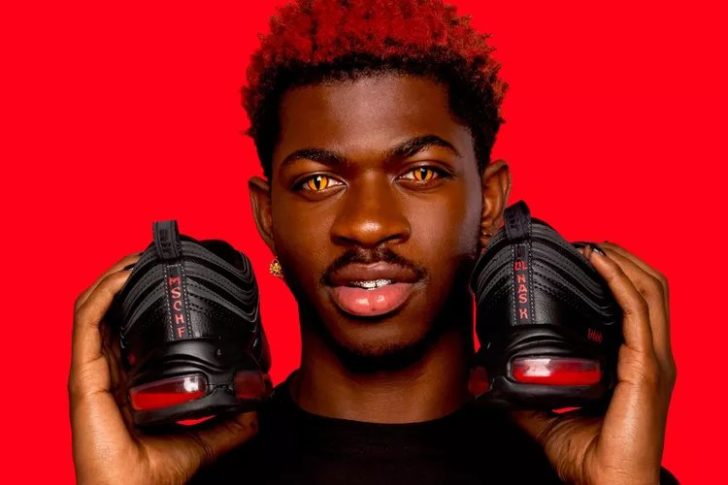Prepare to dive into the world of MSCHF, the mysterious and provocative brand that has taken the world by storm. This unconventional company is shaking up traditional marketing strategies, creating a cult-like following, and pushing the boundaries of creativity. If you’re intrigued by the idea of “structured chaos” and limited edition releases, buckle up and join us on this wild ride as we uncover the mystery behind MSCHF.
Table of Contents
Key Takeaways
MSCHF challenges societal norms with unconventional business models, limited edition releases and the infamous Jesus Shoes & Holy Water controversy.
The team behind MSCHF has revolutionized consumer culture by creating a powerful “cult-like following” through their unique products and artistic endeavors.
They have also challenged traditional marketing strategies to create meaningful cultural moments that spark conversations about important social issues.
The Unconventional Business Model of MSCHF

MSCHF’s business model is far from ordinary, thriving on unconventional practices and “structured chaos.” This approach has allowed the company to create some truly unforgettable products like the infamous ‘Satan Shoes,’ which led to a lawsuit from Nike. MSCHF generates revenue in a number of ways. Primarily by developing and retailing restricted-edition products, collaborating with brands in marketing initiatives and receiving financial assistance from private investors. Their ultimate purpose is to create innovative and provocative experiences that challenge traditional beliefs and spark critical thinking about the world around us.
The company’s process for creating its products involves brainstorming and ideation sessions, research and development, and collaborations with outside companies, such as dairy company partners. They utilize social media and other channels to market and sell their limited-edition products, capitalizing on the buzz surrounding each release. This unique approach to commerce, with work consisting of innovative strategies and partnerships, has made MSCHF a force to be reckoned with in the world of brands and consumer culture.
For more info, visit Word on the Street: How MSCHF Harnesses the Power of Word of Mouth to Build a Brand
The Role of “Structured Chaos”
MSCHF’s business model thrives on the concept of ‘Structured chaos’, fostering creativity and innovation. By embracing this approach, MSCHF has been able to produce unique products like the “Big Red Boots” project and the “Blue Donkey” project. The concept of “structured chaos” permits the company to break free from traditional constraints and explore new ideas that challenge the status quo.
This distinctive component significantly contributes to MSCHF’s success by facilitating the creation of a diverse range of thought-provoking products which spark conversations. “Structured chaos” is the driving force behind MSCHF’s innovative projects and controversial products, ensuring that the brand remains at the forefront of popular culture.
Limited Edition Releases
The sense of urgency and exclusivity instilled by MSCHF’s limited edition releases drives product demand and carves out a unique brand identity for this start up. These special, one-time-only releases are only available for a limited time, often gaining attention in various locations, including cities like New York and even being featured in the New York Times.
The impact of these limited edition releases has been significant, creating a cult-like following and challenging traditional marketing strategies. The production of unique and exclusive products by MSCHF has reshaped consumer culture and catered to a new generation of consumers seeking novelty and exclusivity.
Controversial Products and Legal Battles
MSCHF’s inclination towards controversy is undeniable. Some of their most talked-about products include the ‘Satan Shoes,’ which contained a drop of human blood inside them, and the ‘Jesus Shoes,’ which had holy water in the soles. These products have not only garnered significant attention, but have also led to contentious legal battles, such as the lawsuit filed by Nike against MSCHF.
Regardless of the controversy, MSCHF upholds their commitment to artistic expression and social commentary without apology. They acknowledge the contentious nature of their products but vigorously defend their artistic merit and the conversations they spark. The controversy surrounding their products is a testament to the brand’s commitment to pushing boundaries and challenging norms.
Satan Shoes and Lil Nas X

The Satan Shoes project, a collaboration with rapper Lil Nas X, not only grabbed headlines but also attracted significant attention and a lawsuit from Nike. MSCHF teamed up with the artist to unveil a limited-edition line of Nike Air Max 97s that featured pentagrams, a drop of human blood in the sole, and the words “Luke 10:18” printed on the side. The collaboration sparked outrage and backlash from religious groups and conservative individuals.
In response to the Satan Shoes, Nike sued MSCHF for trademark infringement and obtained a temporary restraining order. The lawsuit was later resolved, but the controversy surrounding the shoes and the collaboration with Lil Nas X remains a prime example of MSCHF’s dedication to pushing the envelope and challenging societal norms.
Jesus Shoes and Holy Water
MSCHF’s Jesus Shoes, customized Air Max 97s filled with holy water from the River Jordan, also stirred controversy and legal issues. The use of religious symbols and the injection of holy water into Nike sneakers led to mixed reactions, with some people finding it offensive and disrespectful, while others saw it as a creative and unique concept.
Although Nike did not take legal action against MSCHF for the Jesus Shoes, they made it clear that they had no involvement in the design. The controversy stirred by the Jesus Shoes underscores MSCHF’s dedication to challenging norms and stimulating conversation and debate through thought-provoking products.
Creative Projects and Artistic Endeavors
MSCHF’s creative projects and artistic endeavors reflect their commitment to pushing boundaries and sparking meaningful dialogues. Through projects like Medical Bill Art and MSCHF. Cut, the brand demonstrates its ability to create innovative and unique experiences that challenge the status quo.
The motivation behind MSCHF’s projects varies, but many seek to challenge popular culture, societal norms, and expectations, or make provocative political statements. These projects not only garner attention, but also underscore the brand’s dedication to producing memorable cultural moments.
Medical Bill Art
Medical Bill. Art is a project that turned medical debt into art, highlighting the issue of healthcare costs in the US. MSCHF transformed actual medical bills into paintings or other artistic forms, turning the financial burden of healthcare into a powerful statement. By using leftover paper from these bills, the project emphasizes the impact of medical expenses on individuals and families.
The art collective popularized Medical Bill Art by turning three Americans’ medical bills into paintings and selling them to erase their debt. This unique project serves as a commentary on the high cost of healthcare and the burden of medical debt, showcasing MSCHF’s commitment to creating thought-provoking and unconventional art.
MSCHF Cut
MSCHF. Cut is a unique take on the traditional art auction, allowing buyers to purchase individual pieces of a larger artwork. Each piece is unique and can be sold separately, as the artwork is cut into individual pieces and sold to the highest bidder.
The impact of MSCHF. Cut on the art world has been significant, as it has allowed artists to create unique works of art that can be sold to multiple buyers, reaching a wider audience and increasing their profits. Additionally, MSCHF is a member of the MSCHF. Cut has had a major impact on consumer culture, allowing consumers to purchase unique pieces of artwork, expressing their individual style, and creativity.
The Minds Behind MSCHF: Gabriel Whaley and Team
The innovative and controversial projects of the brand are driven by its founder, Gabriel Whaley, and his team of creatives. Whaley is the CEO of MSCHF, and the company has a team of 10 employees dedicated to pushing the boundaries of creativity and challenging norms.
Whaley’s initial project involved offering bad advice for 1 dollar on Twitter, which set the tone for the unconventional and provocative projects that MSCHF would come to be known for. Under Whaley’s leadership, the team has embraced “structured chaos” and an unconventional business model, creating a brand that continues to make waves in the world of marketing and consumer culture.
The Impact of MSCHF on Brands and Consumer Culture
With a significant influence on brands and consumer culture, MSCHF challenges traditional marketing strategies and has cultivated a cult-like following. By engaging with their audience through social media, creating unique and unexpected products, and collaborating with celebrities and influencers, MSCHF has managed to cultivate a dedicated fan base.
The shared ideology and strong sense of exclusivity among MSCHF followers fuel the brand’s cult-like following, enabling it to continually shake up the market and compel other brands to reassess their strategies. MSCHF’s bold ideas and unconventional products have garnered a dedicated fan base, proving that their unique approach resonates with consumers.
Challenging Traditional Marketing Strategies
The disruptive marketing approach of MSCHF compels brands to reconsider their strategies. By focusing on creating viral marketing campaigns that generate buzz and word-of-mouth, MSCHF challenges the traditional norms of branding and advertising.
Additionally, MSCHF deliberately avoids traditional branding and celebrity endorsements, instead embracing shockvertisement as a marketing strategy. Their unconventional and disruptive approach to marketing has not only garnered attention, but has also forced other companies to reevaluate their own marketing strategies in the face of MSCHF’s success.
Creating a Cult-like Following
MSCHF’s ability to create a dedicated and passionate following is a testament to their unique approach and innovative products. The shared ideology and strong sense of exclusivity among MSCHF followers fuel the brand’s cult-like following, enabling it to continually shake up the market and compel other brands to reassess their strategies.
Their out-of-the-box ideas and unconventional products have garnered them a dedicated fan base who eagerly anticipate each new release and passionately defend the brand’s artistic merit and social commentary. This cult-like following is a testament to MSCHF’s ability to resonate with consumers and create a lasting impact on brands and consumer culture.
Summary
MSCHF has undoubtedly made its mark on the world, challenging traditional marketing strategies, creating a cult-like following, and pushing the boundaries of creativity. Their unconventional business model, commitment to “structured chaos,” and controversial products have captured the attention of consumers and brands alike. As we uncover the mystery behind MSCHF, it’s clear that this enigmatic brand will continue to provoke thought, spark debate, and leave a lasting impact on the world of marketing and consumer culture.
Frequently Asked Questions
What does MSCHF stand for?
MSCHF stands for “miscellaneous mischief,” an art and advertising collective based in Brooklyn.
They specialize in creating viral internet stunts, often involving collaborations with celebrities and brands.
Is MSCHF a real company?
MSCHF is a real company, founded in 2018, and currently operating as MSCHF Product Studio, Inc. Its founder and CEO, Whaley, collaborated with Lil Nas X to sell the controversial ‘Satan shoe’ and it was joined by software engineer Josh Wardle in 2021.
The company is known for creating viral and controversial products and projects.
Who is the creator of MSCHF boots?
Gabriel. Gabriel. Whaley, founder and CEO of MSCHF and former Buzzfeed employee, is the creator of MSCHF boots. He is 33 and the son of an ex-military officer.
Why are the big red boots so popular?
The Big Red Boots have gained immense popularity due to their unique shape and exaggerated design, inspired by the beloved character Astro Boy.
What is MSCHF’s business model?
MSCHF’s business model is built around unconventional practices and creating limited-edition products, partnered marketing campaigns, and investment funding.
These practices have allowed MSCHF to become a leader in the industry, with a focus on creating unique and innovative products that stand out from the competition.
MSCHF has also been successful in leveraging partnerships with other organizations.









